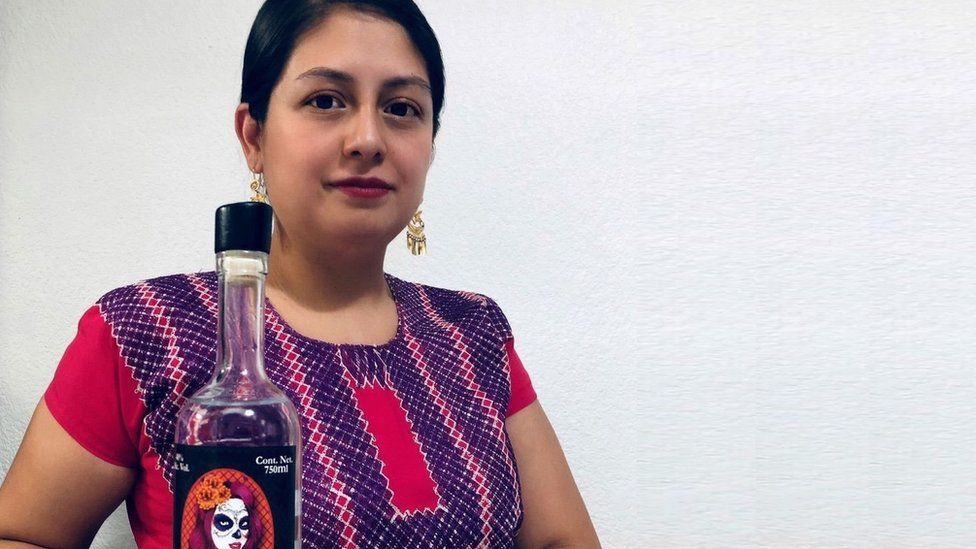Mezcal producers hope to toast brighter future

Patricia Ruíz, a maker of the Mexican spirit mezcal, didn't have much to toast with the drink last year.
In normal times her business, Los Dioses de Agave, bottles 1,000-1,500 litres of its La Maliciosa brand every four weeks.
But for more than four months in 2020, production stopped completely at its distillery in the southern state of Oaxaca.
"Our most frequent clients are bars across the state," she says. But they were all closed by government decree when the coronavirus pandemic hit.
Restaurants also had to shut their doors, and US tourists - who are important to the Oaxaca hospitality sector, and buy a lot of mezcal - disappeared.
"It was a major challenge for us to accept," says Ms Ruíz. "Cash flow dropped a lot, because we couldn't purchase the usual inputs, and then we also couldn't pay people, so everything slowed down like that.
"We had to stop production, and [just try to sell] the stock we already had."
Most other mezcal producers were similarity affected. Exporters saw a slump in sales as bars around the world were also closed. As the pandemic will hopefully come to an end in the near future, how quickly will the sector be able to recover?
But first - what exactly is mezcal? Like the far better known tequila, mezcal is made by fermenting and then distilling the cooked sap and pulp of the agave plant.
While tequila has to be made from a certain type of agave - blue agave - grown in a particular region of central Mexico, mezcal can use any variety of the plant. Mezcal can also be made across Mexico, although production is centred on Oaxaca in the south.
Tequila's global sales dwarf those of mezcal - 355 million litres in 2019 compared with just 7.14 million - but mezcal has been growing in popularity.
Gabriel Martínez has been producing mezcal in the southern state of Guerrero for the past seven years under the label Ay Dolor! He is based in a small village that is home to indigenous Nahuas people. Transport in and out of the local area was restricted when the pandemic hit.
Ay Dolor! has just begun production again. And Mr Martínez recently met fellow producers in the state to compare notes on losses and plan for future recovery.
"The truth is that exports [from Guerrero] have dropped 50 or 60%."
Across Mexico as a whole, exports of mezcallast year fell by 21% to 4.54 million litres from 5.77 million in 2019, according to figures from the Ministry of Economy. Total production of the drink was 6.5 million litres in 2020, down from the 7.14 million in 2019.
These falls followed a boom in exports of
more than a third annually since 2015,
driven by high demand in the US.
Yet last year's production decline could actually
be a good thing, environmentally. As international sales
soared in 2019, many were concerned about impact of this demand on mezcal's agave plantations, such as soil exhaustion and water supply.
Miriam Luna, who sells mezcal from the states of Oaxaca and Durango under her label Limbo, has observed that the plantations are also affected by pests and the risk of extinction of some varieties.
She also points out that, pandemic or no pandemic, the industry faces many challenges that have intersecting roots - not just environmental sustainability, but also poverty, and a lack of regulation.
"There are high costs for the producers, especially those who suffer from marginalisation and poverty," says Ms Luna.
When it comes to running her brand, last year she converted most of her sales to home deliveries in Mexico City.
Another mezcal producer, Leyla Daw, took to Zoom conference calls to drum up business last year.
"When the pandemic hit I was really scared for my business," says Ms Daw, whose label is called Eterna Libertad. "I was getting ready to put my mezcal in restaurants, in retail stores, and I had to put that all on hold."
"Nobody was buying", she says.
However, the entrepreneur says she now believes "this pandemic came into my life to show me something - that people want to know about mezcal".
She realised that in the pandemic "everyone is behind the screen". So she took her product to Zoom, hosting online tastings for anyone who wanted to join, and selling bottles via an online drinks store.
Ms Daw says the tastings have been a hit: "I reach more people now - in 2020 and 2021 - than in the previous five years I have been producing mezcal.
"I had a mezcal tasting last year with 700 people connected! And then companies started contacting me saying they want this experience for their clients."
Ms Daw says she has found that "people really want to know how to drink mezcal". Unlike its close cousin tequila, one drinks mezcal slowly, not in quick shots.
Across in the country, Mexico's state and federal governments have committed resources to helping parts of the industry affected by the pandemic get back on their feet.
And producers such as Patricia Ruíz, Gabriel Martínez, Miriam Luna and Leyla Daw are not going anywhere.

Get Excellent HP HP2-I14 PDF Dumps & Practice Test With Free Demo
- HP2-I14 exam | HP2-I14 exam dumps | HP HP2-I14 exam | HP2-I14 practice exam | HP2-I14 actual exam | HP2-I14 braindumps | HP2-I14 questions & answers

The Secrets to Pass Adobe AD0-E302 Certification Exams With Ease
- Your sons or daughters are intently inspired by instruction. It not simply assists situation their check out with all the earth in addition

Police, protesters clash at Republic Day march in Turkey
- On a day marking the 89th anniversary of the founding of Turkey, a country that has marketed itself

Brussels attacks: Victims IDd, loved ones sought
- The explosions wounded at least 270 people and left several more missing. <br><br>The victims span 4